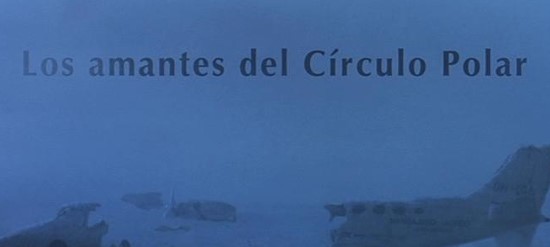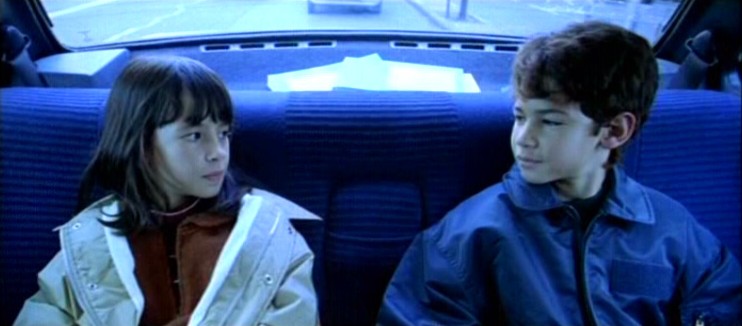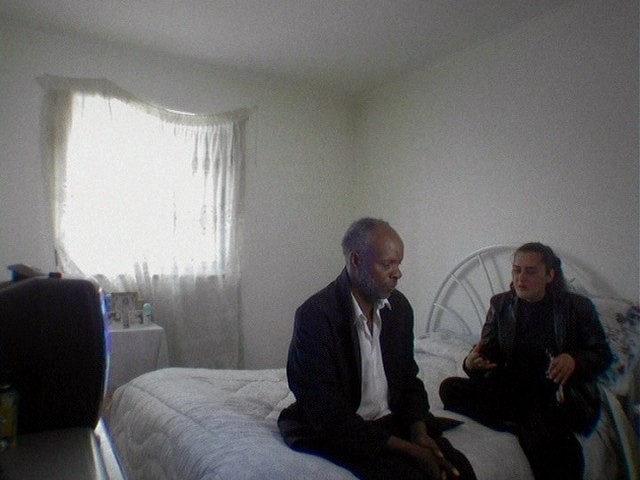From the Chicago Reader, May 14, 1999. —J.R.

The Lovers of the Arctic Circle
Rating *** A must see
Directed and written by Julio Medem
With Fele Martinez, Najwa Nimri, Nancho Novo, Maru Valdivielso, Peru Medem, Sara Valiente, Victor Hugo Oliveira, and Kristel Diaz.

Julio Medem’s fourth feature is a love story spanning 17 years — from the time Otto and Ana first meet, as children in a Spanish school yard, to their improbable reunion in the wilds of northern Finland when they’re 25. But the film starts at the end rather than the beginning, and like the names of the two characters, the story can be read backward as well as forward. That story is told by Otto and Ana in alternate bursts, inflected mainly by how Otto views Ana and vice versa, skipping back and forth in time. To make things trickier, the two versions of what happens are sometimes at variance.
When The Lovers of the Arctic Circle joined Open Your Eyes at the Fine Arts last week, it became possible to conclude, with a sigh of relief, that the age of Pedro Almodovar was finally over. I don’t mean that Almodovar won’t continue to make movies or get American distribution, but that his brand of smart-aleck entertainment will no longer have to stand for the whole of Spanish cinema. Read more
From the Chicago Reader, April 2, 1999. —J.R.
Destiny
Rating *** A must see
Directed by Youssef Chahine
Written by Chahine and Khaled Youssef
With Nour el-Cherif, Laila Eloui, Mahmoud Hemeida, Safia el-Emary, Mohamed Mounir, Khaled el-Nabaoui, Abdallah Mahmoud, and Ahmed Fouad-Selim.
The Adopted Son
Rating *** A must see
Directed by Aktan Abdikalikov
Written by Abdikalikov, Avtandil Adikulov, and Marat Sarulu
With Mirlan Abdikalikov, Albina Imasmeva, Adir Abilkassimov, Bakit Zilkieciev, and Mirlan Cinkozoev.


Apart from their exoticism, Youssef Chahine’s Destiny and Aktan Abdikalikov’s The Adopted Son don’t have much in common. Destiny is the 35th film by Chahine, a 73-year-old writer, director, and sometime actor who’s generally agreed to be the major figure in the history of Egyptian cinema. His subject here is Averroes (1126-1198), a dissident Spanish-Arab philosopher best known for his commentaries on Aristotle, and his film resembles a Hollywood period spectacular — exuberant, packed with action, and positively overflowing with energy. The Adopted Son is both the first independent feature ever made in Kyrgyzstan — a former Soviet republic in central Asia — and the first feature of 42-year-old writer-director Abdikalikov, who cast his own teenage son in the title role. It’s shot mainly in an exquisitely modulated black and white, though it periodically shifts to color, always with great dramatic effect. Read more
Written circa June 2010 and previously unpublished. — J.R.


I can still recall the amusement of Penelope Houston — my boss, during the mid-1970s, when I was working for British Film Institute’s Editorial Department, on the staffs of Sight and Sound and Monthly Film Bulletin — whenever she came across routine references to directors Samuel Fuller and Douglas Sirk as “neglected” figures. Even though very few Anglo-American cinephiles could have even identified Fuller and Sirk during the 1950s, when most of their major films were coming out, Penelope certainly had a point when it came to questioning how “neglected” they still were among contemporary cinephiles in the U.K., especially after the Edinburgh film festival had extensive retrospectives devoted to each of them in 1969 and 1972, respectively. By the mid-70s, at least three books about Fuller and two about Sirk were available in the U.K — none of which appeared to have the slightest effect on their status as “neglected” filmmakers, according to the usual sound-bites.
Penelope indeed had a point. But then again, so did the various teachers and journalists who described Fuller and Sirk as “neglected,” because even though one book about each figure was published in the British Film Institute’s Cinema One series (a joint effort of the BFI’s Editorial and Education Departments in which Peter Wollen had a voice as well as Penelope), these directors remained relatively shadowy figures in Sight and Sound, a quarterly in that period which had a guaranteed subscription list based on BFI membership and therefore an unparalleled degree of clout over other film magazines in the U.K. Read more






